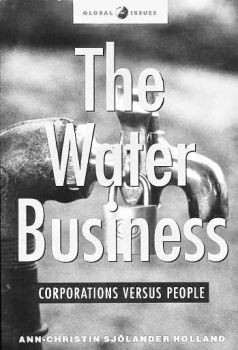
A growing row between developing countries and the west is set to to become even more intense as western countries continue to block a proposal to recognise the right to water as a basic universal human right.
While mainstream media reports has reported on western countries holding meetings to allegedly discuss addressing world poverty and hunger contradicting reports revealing the wicked intentions of the west overseas is rarely reported.
There is deafening silence in the media regarding how western countries deliberately stand in the way of progress in developing countries.
An example of this is the continuing row between the developing countries and the west regarding water. Developing countries have long fought for water to be recognised as a basic universal human right, a proposal which is opposed by countries such as Britain and the United States.
Maude Barlow, a global water advocate and a founder of the Canada-based Blue Planet Project told Inter Press News Agency (IPS) that if the draft resolution proposed by Bolivia was adopted by the U.N. “It would be one of the most important things the United Nations has done since the Universal Declaration of Human Rights.” (Deen: IPS: 15 July)
The privatisation of the world’s water supply
It does not take much stretch of the imagination to work out why the west is opposed to water rights in developing countries. The simple reason is that for years western multinational companies have increasingly pressed to privatise the water supplies on a global scale for profit.
In 2001, the Trades Union Congress (TUC) in Ghana, the largest organised labour in the country rejected what it referred to as the “suspicious” privatisation of Ghana’s water supply “…being pushed by the International Monetary Fund and the World Bank as conditionality for loan to reform Ghana’s water sector.” (Arthur: AllAfrica.com: 8 October, 2001)
Note that the World Bank and the International Monetary Fund, international organisations which claim to be acting in the interests of global harmony were in fact acting as agents for western private companies.
The TUC said that poor people would suffer the most if Ghana’s water was privatised as they would not be able to afford it.
On March 5, 2004, Mark Sommer wrote an article titled, ‘LIQUID GOLD RUSH: PRIVATISING GLOBAL WATER RESOURCES’. In this article he argued how multinationals have turned their attentions to controlling water supplies globally as this resource is set to become scarce and therefore a valuable commodity to own and control in the future. In a world with a rapidly growing population private companies see the ownership of water as potentially providing them vast profits in the future.
Multinationals with the aid of the World Bank, International Monetary Fund and the World Trade Organisation planned their strategy in populated cities like Buenos Aires, Johannesburg, New Delhi and Manila, but these projects failed due to local opposition.
One such famous opposition occurred in Cochabamba, Bolivia, in 2000. According to Sommer, “In Cochabamba, an ad hoc coalition of rural campesinos and urban shantytown residents flooded the streets of that city of a million people, endured a hail of bullets from the Bolivian Army and forced cancellation of a contract with the U.S. engineering giant, Bechtel, that had tripled their water rates and claimed ownership of wells, springs and rivers that had been a common resource for thousands of years.”
No doubt the western multinationals will continue to press for the privatisation of the water supply in developing countries and the battles won by local people in places like Cochabamba is merely the beginning of the wider war corporate companies have waged on local people all over the world.
What is disappointing to observe is that black and minority ethnic communities in the UK are often scarce at global anti-capitalist marches despite the fact that their ancestral heritage comes from the countries that are being exploited.
For further research:
http://www.ipsnews.net/news.asp?idnews=52173
http://allafrica.com/stories/200110080625.html
http://other-news.info/index.php?p=392
